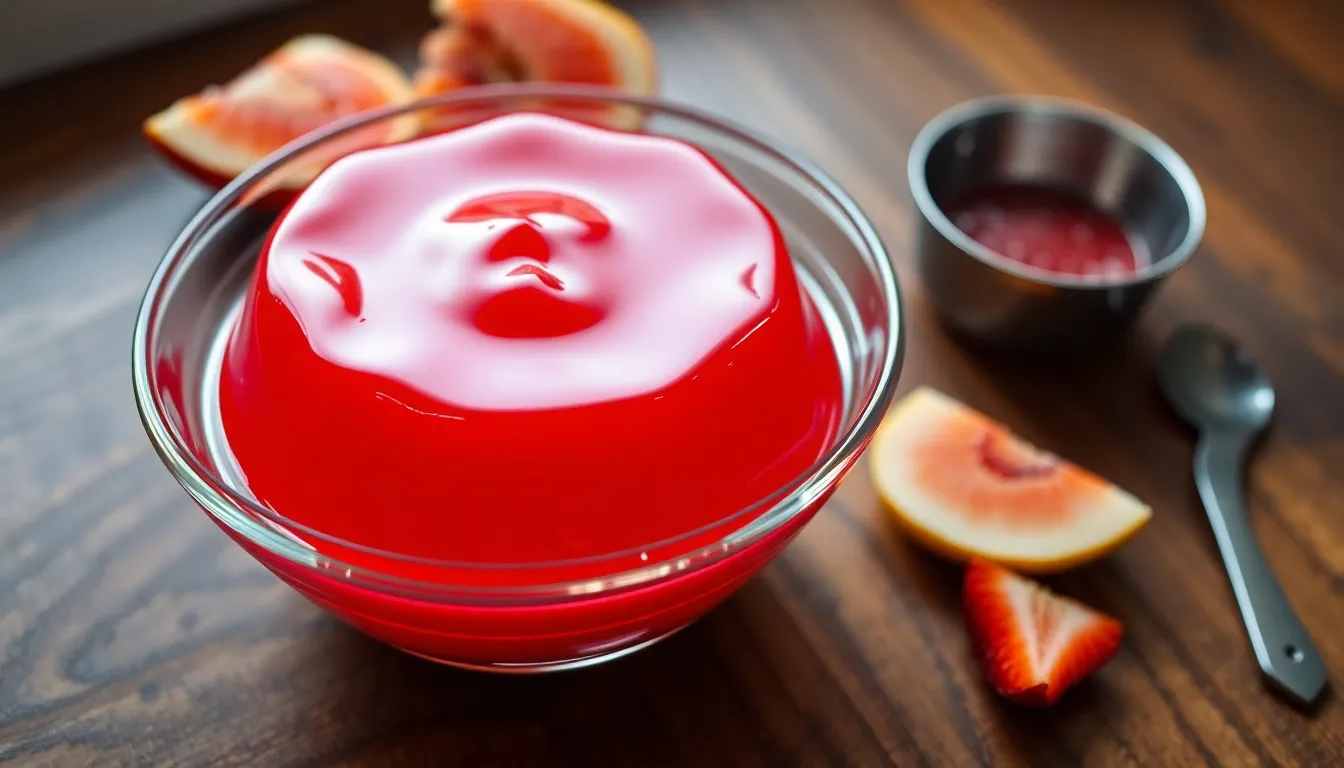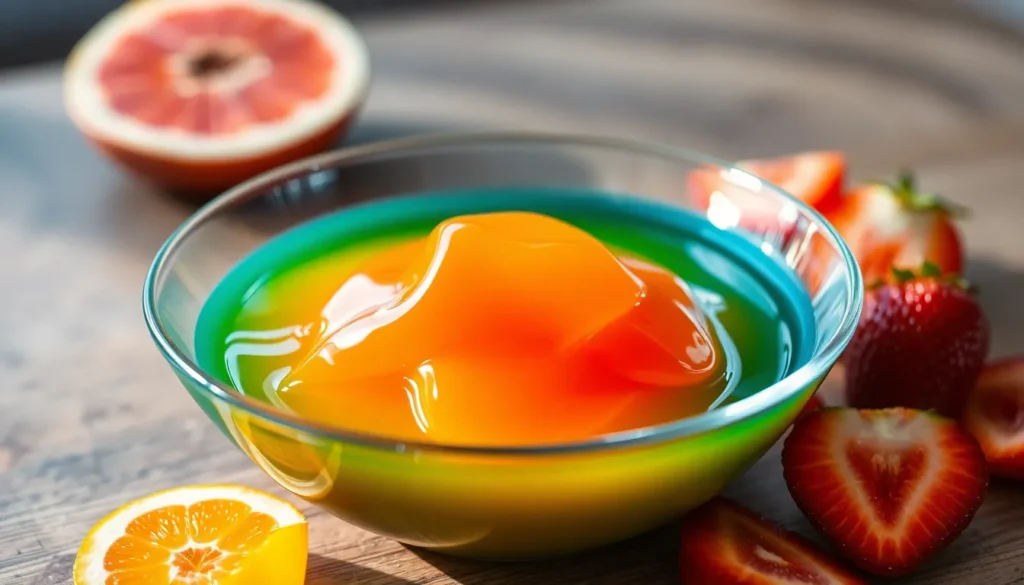Table of Contents
ToggleSugar-free Jello has become a popular choice for those looking to satisfy their sweet tooth without the added calories of traditional desserts. With its vibrant colors and appealing texture, it’s often seen as a guilt-free treat. But is it truly a healthy option?
Many people wonder about the nutritional value of sugar-free Jello and its potential effects on overall health. While it offers a low-calorie alternative, the ingredients used to replace sugar can raise questions. Understanding its benefits and drawbacks is essential for making informed dietary choices. Let’s dive into the facts and explore whether sugar-free Jello deserves a spot in a balanced diet.
Overview of Sugar Free Jello
Sugar-free Jello offers a low-calorie dessert alternative, appealing to those avoiding traditional sweets. Made with artificial sweeteners like aspartame or sucralose, it provides sweetness without added sugar and calories. A typical serving contains approximately 10 calories, making it a convenient choice for maintaining a calorie deficit.
Ingredients include gelatin, artificial flavors, and colors. Gelatin, derived from animal collagen, contributes to its unique texture. While sugar-free Jello contains no sugar, it’s essential to consider the potential effects of artificial sweeteners on overall health. Some studies suggest these sweeteners may disrupt gut microbiota or influence cravings.
Sugar-free Jello is primarily fat-free and low in carbohydrates, which can benefit individuals on specific diets like low-carb or ketogenic plans. Its hydrating qualities make it a refreshing snack, particularly in warmer months. However, moderation is key, as excessive consumption of artificial sweeteners may lead to digestive discomfort for some individuals.
Nutritional Content of Sugar Free Jello


Sugar-free Jello offers a low-calorie dessert option, yet its nutritional content varies based on the ingredients used. Understanding its components helps in evaluating its overall health implications.
Ingredients Breakdown
Sugar-free Jello typically contains water, artificial sweeteners, flavorings, and gelling agents. The most common sweeteners are aspartame or sucralose, providing sweetness without calories. Other ingredients include:
- Gelatin: Helps achieve the desired texture and consistency.
- Citric Acid: Enhances flavor while acting as a preservative.
- Color Additives: Provide visual appeal without additional calories.
These ingredients collectively contribute to the low-calorie profile, making sugar-free Jello suitable for various dietary plans.
Caloric Value and Serving Size
A typical serving of sugar-free Jello contains approximately 10 calories per 1/2 cup (around 125 grams). This minimal caloric value supports those aiming to reduce their calorie intake. Serving size is crucial; larger portions result in higher calorie consumption despite the low baseline. It’s important to read labels for specific brands, as variations may exist, but overall, sugar-free Jello remains a low-cal option in dessert choices.
Health Benefits of Sugar Free Jello
Sugar-free Jello offers several health benefits, particularly for those seeking low-calorie dessert alternatives. Its unique formulation serves various dietary needs while satisfying sweet cravings.
Low-Calorie Snack Option
Sugar-free Jello contains approximately 10 calories per 1/2 cup serving, making it an ideal low-calorie snack choice. It provides a sweet treat without adding significant caloric intake, which can aid in weight management. The absence of sugar reduces the likelihood of sugar spikes and crashes, supporting stable energy levels throughout the day. For those following calorie-restricted diets, it delivers a guilt-free indulgence.
Potential Dietary Benefits
Sugar-free Jello contributes hydration due to its water content, supporting overall wellness. It’s fat-free and low in carbohydrates, making it suitable for various dietary plans, including low-carb and ketogenic approaches. Additionally, sugar-free Jello contains gelatin, which may offer benefits for joint health and digestion. While it provides a sweet taste, it lacks added sugars, aligning with healthier eating patterns and reducing potential risks associated with sugar consumption, such as tooth decay or obesity.
Possible Drawbacks of Sugar Free Jello
Sugar-free Jello presents potential drawbacks that warrant consideration. While low in calories, some ingredients may impact overall health.
Artificial Sweeteners and Their Effects
Artificial sweeteners, such as aspartame and sucralose, replace sugar in sugar-free Jello. These substances may affect gut microbiota, as some studies indicate a connection between artificial sweeteners and altered gut health. They can also heighten cravings for sweet foods, leading to increased appetite among some individuals. Reactions to these sweeteners vary; headaches or digestive upset may occur in sensitive individuals. Understanding individual responses to these ingredients is crucial when incorporating sugar-free Jello into a diet.
Nutritional Concerns
Despite being low in calories and fat, sugar-free Jello lacks significant nutritional value. The absence of vitamins and minerals means it shouldn’t be relied upon for nutritional needs. Relying on such desserts could lead to imbalanced eating patterns, as users might overlook more nutritionally dense foods. Additionally, larger servings may inadvertently increase calorie intake, potentially counteracting its benefits if consumed excessively. Moderation remains essential to avoid unintended consequences in dietary habits.
Sugar-free Jello can be a tempting low-calorie dessert option for those looking to satisfy their sweet tooth without the added sugars. Its hydrating properties and low-calorie content make it appealing for various dietary plans. However it’s essential to consume it in moderation due to the potential effects of artificial sweeteners on health and cravings. While it offers minimal calories and some benefits like joint health support from gelatin its lack of significant nutritional value means it shouldn’t be a staple in one’s diet. Balancing treats like sugar-free Jello with nutrient-rich foods is key to maintaining overall health and well-being.







